Colonial America was home to nine colleges still in existence. Institutional histories cover their founding and leadership, but lack some of the gritty essence of students’ daily lives then. In Pedagogues and Protestors: The Harvard College Student Diary of Stephen Peabody, 1767-1768 (University of Massachusetts Press, $27.95 paper), superb editor Conrad Edick Wright ’72, director of research at the Massachusetts Historical Society, has made accessible perhaps the best source for such a perspective. This excerpt is from his introduction about an “unexceptional collegian.”
Since Stephen Peabody’s diary provides the best available entrée into the Harvard community in the late 1760s, a close look at his day—how he spent it and with whom—repays the effort. Without an acceptable excuse there was no easy way around certain obligations, including morning prayers, daily recitations and lectures, and Sunday services; as long as Stephen was in town he hardly ever missed them. Then it was important to study enough to avoid faculty harassment. There were other ways to pass the time, though, and Peabody was only too happy to succumb to them. A multiday wrestling competition between the freshmen and the sophomores beginning on August 20, 1767, engaged him and other observers. There was nutting, which Stephen and some friends did on October 3, a day when the trees were full of chestnuts. Singing was a popular pastime, and Peabody reported informal harmonizing, usually with other undergraduates, at least 60 times. There were evenings with schoolmates—often for pleasure but every Saturday for prayer and discussion of matters of faith at the weekly meeting of some of the college’s more pious undergraduates. There were recreational excursions, including a day-long outing Stephen took with a friend on May 25, the second day of the journal, which steered him along a great loop from Charlestown to Boston, Brookline, Watertown, and then back to Cambridge. And there were errands to run, sometimes a few paces outside Harvard Yard in what is now Harvard Square, or more appealingly in Boston, where an outing might include attending a minister’s weekday lecture, viewing the muster of a militia company, dropping off a short article for publication in one of the town’s weeklies, or dining with acquaintances as well as visiting the metropolis’s shops.
Most of all, there was reading. With a substantial provincial library at Peabody’s fingertips it would be a waste not to read, and he did so avidly. Whether or not Stephen wrote in his diary about his curricular reading, apparently a subject of precious little consequence to him, his reading during his free time almost always merited a mention. In the course of the year Peabody’s diary covers he reported reading 72 titles….









